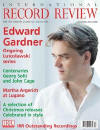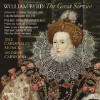Texte paru dans: / Appeared in:
*

International Record Review -
Pour
s'abonner / Subscription information
Hyperion
CDA67937
In 2010 Andrew Carwood and The Cardinall’s Musick released the thirteenth and final volume in their monumental Byrd Edition, which straddles two labels — ASV/Sanctuary Classics, and Hyperion and embraces all of the composer’s Latin church music. This new recording tackles Byrd in English and includes not only the Catholic composer’s late masterpiece for the reformed Church of England, The Great Service, but ‘Unto the hills mine eyes I lift’ from Songs of Sundrie Natures ( 15 89) and a selection from Psalmes, Songs and Sonnets (1611).
Amazingly, The Great Service was discovered only in 1922 by the redoubtable Edmund Fellowes, who came across it in the manuscripts of Durham Cathedral; he subsequently called it the ‘finest unaccompanied setting of the service in the entire repertory of English church music’. Unlike Byrd’s earlier, simpler and smaller-scale Short Service, Second Service and Third Service for the Anglican church, The Great Service is scored for ten parts (SAATB, SAATB) and features complex combinations of polyphony, homophony, imitation and the setting of both equal and unequal forces against each other — all as a way of heightening the drama and highlighting the meaning of the text.
There are, of course, many great recordings of The Great Service available, those by the Choir of Westminster Abbey (also on Hyperion) and The Tallis Scholars among them; there are also curiosities, such as the recent recording by Musica Contexta accompanied by not just an organ but The English Cornett and Sackbut Ensemble. Each of the aforementioned has something to offer in terms of bringing the dramatic qualities of the music to life, albeit in very different ways (and certainly if what you’re after is the unparalleled impact of a larger, traditional cathedral choir and boy trebles performing in an incredible acoustic, then the Westminster Abbey recording is hard to beat).
However, this new recording is something special. Whether
it’s because of the sheer experience of having sung so much of Byrd’s music
as to have assimilated his musical language utterly, or whether it’s simply
the raw musicianship and cultivated intelligence of the performers, there’s
a clarity and intensity in each verse that is spine-tingling. In his
excellent booklet notes, Carwood rightly mentions a moment in the
‘Magnificat’ where Byrd scatters the proud ‘not only “in the imagination of
their hearts” but audibly in the music’. Here, as elsewhere, the latent
energy of the words as made manifest in Byrd’s setting is realized with the
kind of skill and conviction that moves rather than simply amazes. Which is,
I guess, the point of religious music.
Fermer la fenêtre/Close window
Cliquez l'un ou l'autre
bouton pour découvrir bien d'autres critiques de CD
Click either button for many other reviews



